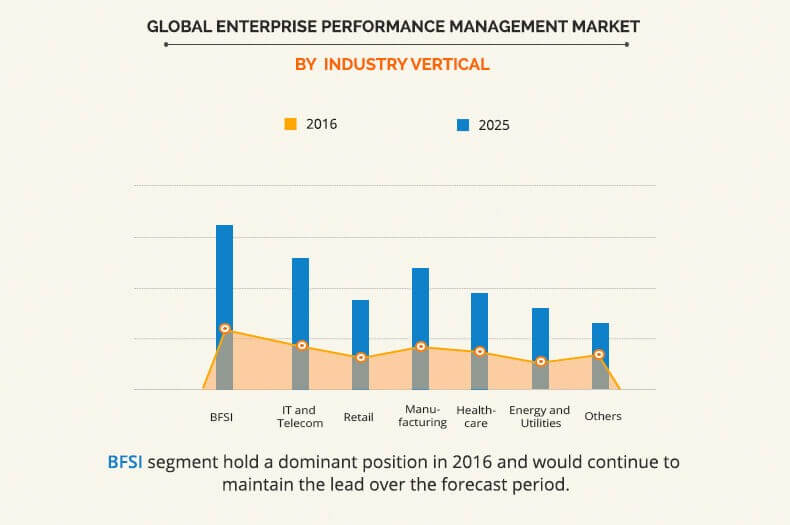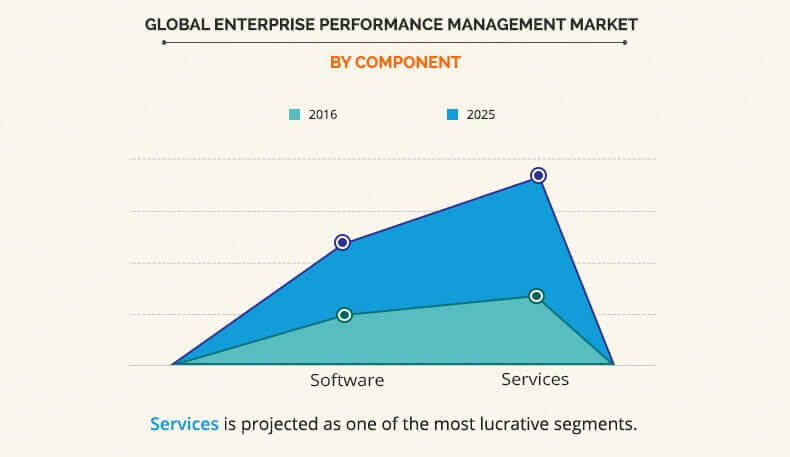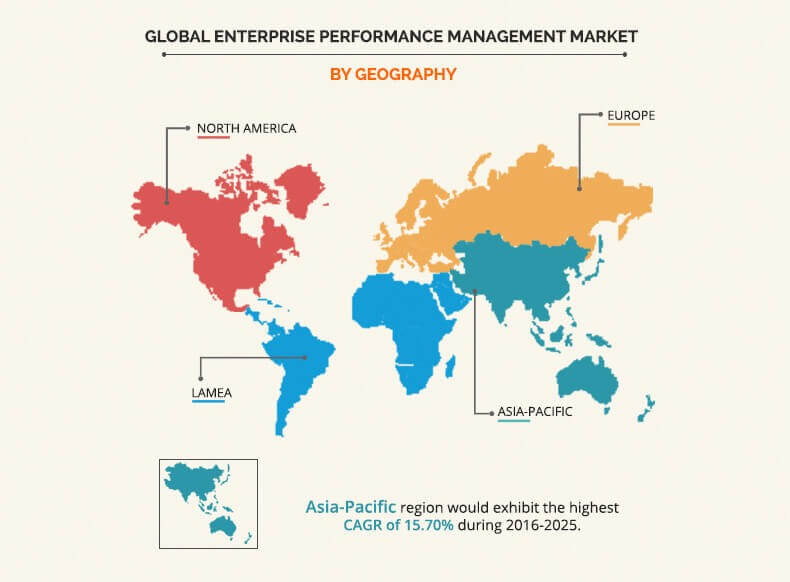Enterprise Performance Management Market Statistics, 2025
The global enterprise performance management market was valued at $4,738 million in 2016, and is projected to reach $12,562 million by 2025, growing at a CAGR of 11.70% from 2018 to 2025.
Rise in need for making business strategy transparent to all employees, increase in focus on core business, and improvement in performance are some of the major factors that propel the growth of the enterprise performance management market. Furthermore, the rise in adoption of cloud-based EPM across the globe is expected to provide promising opportunities for this market. However, risks in implementation and shifting of the workload from on-premise to cloud hamper the growth of this market.
Enterprise Performance Management (EPM) is a process designed to support organizations such as companies, government entities, and nonprofits link their strategies to their plans and execution. EPM includes management processes such as budgeting, planning forecasting, and modeling. In addition, it includes consolidating results and closing books. Moreover, it analyzes the performance and helps in making informed decisions. Furthermore, EPM software enables reporting the results to internal as well as external stakeholders.
The BFSI segment led the market in 2016, and is expected to dominate in the near future. However, the energy & utility segment is expected to grow at a significant pace during the forecast period. Furthermore, North America is expected to dominate the overall market during the forecast period, as it experiences the highest demand for enterprise performance management software.
The report focuses on the growth prospects and restraints of the market based on the analysis of regional trends. The study provides Porter’s Five Forces analysis of the industry to understand the impact of various factors such as bargaining power of suppliers, competitive intensity of competitors, threat of new entrants, threat of substitutes, and bargaining power of buyers on the growth of the market.
Segment Review
The global enterprise performance management market is segmented based on component, deployment, function, industry vertical, and geography. By component, the market is divided into software and services. On the basis of deployment, it is categorized into on-premise and cloud. Depending on the function, it is fragmented into finance, human resource (HR), supply chain, and others. According to industry vertical, it is classified into BFSI, IT & telecom, retail, manufacturing, healthcare, energy & utilities, and others. Geographically, it is analyzed across North America, Europe, Asia-Pacific, and LAMEA.
The global enterprise performance management market is dominated by key players such as Adaptive Insights Inc., Anaplan, Inc., BOARD International S.A., Host Analytics Inc., IBM Corporation, Infor Inc., Oracle, SAP SE, CCH Tagetik (Wolters Kluwer NV), and Workiva.
Top Impacting Factors
Increase in need for making business strategy transparent to all employees, rise in focus on core business & improved scalability and increase in demand for cloud-based EPM software drive the market growth. However, risks in implementation are expected to hamper the market growth during the forecast period.

Increase in Need for Making Business Strategy Transparent to All Employees
It is necessary for the companies to have their every strategy aligned to achieve the goals of the company. The enterprise performance management software is needed to resolve lack of strategic focus among employees of the company set by the key executives. In addition, this software helps in mapping the goals with current performance helping users to understand and gain the perspectives of the work to be done for getting desired results. The transparency regarding business strategies among employees can be delivered through the scorecards and dashboards of the EPM software. This results in the strategic growth and increase in productivity of the employees according to the set rules by the organization.
Rise in Focus on Core Business & Improved Scalability
The need for better and more resources is increasing with the growth of the business. Thus, companies need efficient EPM software to scale according to the demand to increase capabilities and licenses as needed. This software provides scalability and high performance, as the business expands and grows. Moreover, it provides predictive analytics to decrease the time spent for the finance function enabling more focus on higher value tasks. It delivers operational efficiencies by automating routine tasks, reducing planning efforts & reporting, and provides Key performance indicators (KPI) & metrics for better assessment, and financial closures, and giving organizations qualitative business insights periodically. In this way, EPM software allows companies to better focus on the core business functions and improves decision-making rather than handling routine financial and nonfinancial tasks.
Risks in Implementation
Enterprise performance management has complex operational procedures, due to integration of associated additional components. This adds to the system cost as well as increases the overall cost for the organization, owing to the complications associated with installation and requirement of experienced and skilled professionals. Moreover, these systems require regular maintenance checks to ensure the functionality of the system and reliability, which result in extra maintenance cost that impedes the growth of the market.
Increase in Demand For Cloud-based EPM Software
Integration of cloud-based infrastructure and business analytics is expected to provide lucrative growth opportunities to the industry verticals such as manufacturing, financial services, consumer packaged goods, retail, and others. Faster time to value (TTV), reduced total cost of ownership (TCO), and increased autonomy are some of the factors, which are expected to fuel the market demand during the forecast period. The adoption of cloud-based EPM software is increasing significantly, owing to the benefits such as real-time availability of operational and financial data that is not available using existing legacy and on-premise systems. Infrastructure costs ranging from operating system updates to server upgrades also increase the costs of maintaining on-premise enterprise performance management systems, without an assurance of higher quality. Cloud-based EPM application updates are automatically pushed out to customers. Thus, all these factors are anticipated to offer future opportunities for cloud-based EPM software market.
Key Benefits
- This study includes the analytical depiction of the global enterprise performance management market along with current trends and future estimations to determine the imminent investment pockets.
- The report presents information related to key drivers, restraints, and opportunities.
- The current market is quantitatively analyzed from 2016 to 2025 to highlight the financial competency of the industry.
- Porter’s Five Forces analysis illustrates the potency of buyers & suppliers in the global enterprise performance management industry.
Enterprise Performance Management Market Report Highlights
| Aspects | Details |
| By COMPONENT |
|
| By DEPLOYMENT |
|
| By FUNCTIONS |
|
| By INDUSTRY VERTICAL |
|
| By Region |
|
| Key Market Players | ORACLE, HOST ANALYTICS INC, BOARD INTERNATIONAL S.A, ANAPLAN, INC, IBM, CCH TAGETIK (WOLTERS KLUWER NV), ADAPTIVE INSIGHTS INC, INFOR INC, WORKIVA, SAP SE |
Analyst Review
Enterprise performance management solution provides a central platform to track and manage the performance in an organization. It monitors the performance and aligns the strategies to the goals of the company. Adoption of enterprise performance management software has increased over a period of time, due to factors such as rise in demand for automated performance management, owing to ever increase in workforce in organizations. Furthermore, rise in awareness about accurate predictions & forecasts increase in need to improve the productivity boost the growth of the global enterprise performance management market.
Moreover, extensive adoption of cloud technology and increase in demand for mobility are anticipated to create lucrative opportunities for the market. Furthermore, leading vendors are offering mobile applications supporting android as well as iOS platforms for enterprise performance management. In addition, the adoption of cloud-based EPM is expected to increase over the coming years, owing to the factors such as saving the cost of heavy infrastructure investment for deploying the EPM software on premises and easy accessibility of data over different geographical locations offices, flexible resources allocation, real-time integration of data, and timely automatic updates.
Some of the key players o profiled in the report include Adaptive Insights Inc., Anaplan, Inc., BOARD International S.A., Host Analytics Inc., IBM Corporation, Infor Inc., Oracle, SAP SE, CCH Tagetik (Wolters Kluwer NV), and Workiva. The market players have adopted various growth strategies to enhance their product portfolio and market penetration. The key players of the market launch new products to increase their customer base and to cater the demands of the customers. For instance, in March 2018, Host Analytics launched Project Orion, a revolutionary offering, the first EPM product specifically was intended for business users (non-finance professionals), as opposed to finance professionals. Project Orion revokes the concept that business users and finance professionals should use the same interface to an EPM system.
Loading Table Of Content...






